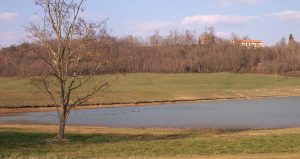EEA: ‘Sustainable agriculture key to achieve WFD goals’

-
 Editorial Team
Editorial Team
Share article:
Reducing pressure of agriculture is key to improve the state of European waters. Widespread implementation of sustainable agriculture will have a positive effect on water quality and biodiversity, writes the European Environment Agency (EEA) in the recent publication ‘Water and agriculture, towards sustainable solutions’.
The report ‘Water and agriculture, towards sustainable solutions’ states agriculture must be based on agro-ecological principles, organic agriculture and nature-based solutions. Therefore ambitious measures to promote sustainable agriculture are needed in the European Agricultural Policy for 2021-2027.
Agriculture harmful to water quality
The latest State-of-Water-study by the European Environment Agency shows that more than half of Europe’s waters are still not in good condition. The state of Europe’s regional seas has been described as ‘alarming’. Agricultural activities cause pollution by nutrients and chemicals, over abstraction of water and physical changes in the environment, including through water storage and landslides. If we want to achieve the WFD goals, we have to adapt agriculture, EEA states.
Points of improvement
The environmental agency therefore advocates three points for improvement. Widespread implementation of sustainable agriculture based on agro-ecological principles, organic farming and nature-based solutions (1). Addressing activities leading to pollution and prioritizing funding for sustainable agriculture in the upcoming strategic plans of the future Common Agricultural Policy (2). Opting for an integrated approach, in which not only agriculture and consumer demands change, but also a transition in food and energy systems takes place (3).
Green Deal
In the context of the European Green Deal, the European Commission has presented various initiatives to strengthen sustainability. Consider, for example, biodiversity 2030, from farm to fork, climate adaptation strategies and balanced nutrient management. According to EEA, these initiatives can provide a solution.

















